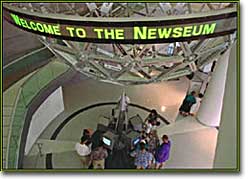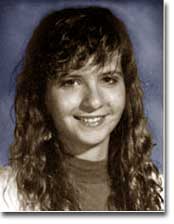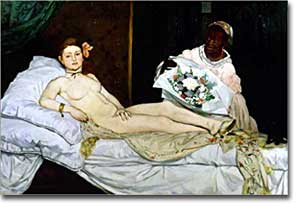


The Newseum, located in Arlington, Virginia, is a museum of news and press freedom. Thanks to the guarantees of the First Amendment, Americans have freer access to news than people in most countries.
"Congress shall make no law respecting an establishment of religion, or prohibiting the free exercise thereof; or abridging the freedom of speech, or of the press; or the right of the people peaceably to assemble, and to petition the government for a redress of grievances." - First Amendment to the Constitution
A careful reading of the First Amendment reveals that it protects several basic liberties — freedom of religion, speech, press, petition, and assembly. Interpretation of the amendment is far from easy, as court case after court case has tried to define the limits of these freedoms. The definitions have evolved throughout American history, and the process continues today.

Deborah Weisman was a Jewish student who successfully sued her public school district in Rhode Island over a Christian graduation prayer in 1986. In her case, Weisman cited the First Amendment's clause against the state establishing any religion.
The First Amendment guarantees freedom of religion in two clauses — the "establishment" clause, which prohibits the government from establishing an official church, and the "free exercise" clause that allows people to worship as they please. Notice that the phrase "separation of church and state" does not appear in the First Amendment, nor is it found anywhere else in the Constitution. Most people do not realize that the phrase was actually coined later by Thomas Jefferson. In 1802, when he was President, he wrote the opinion that the First Amendment's freedom of religion clause was designed to build "a wall of separation between Church and State."
Court cases that address freedom of religion have dealt with the rejection of prayer in public schools, the denial of aid to parochial schools, the banning of polygamy (the practice of having more than one wife), the restriction of poisonous snakes and drugs in religious rites, and limiting the right to decline medical care for religious purposes.
Free speech is one of the most cherished liberties, but free speech often conflicts with other rights and liberties. The courts have had to consider the question, "What are the limits of free speech?"
The "clear and present danger" test is a basic principle for deciding the limits of free speech. It was set by the famous Schenck v. the United States case from World War I. Antiwar activist Charles Schenck was arrested for sending leaflets to prospective army draftees encouraging them to ignore their draft notices. The United States claimed that Schenck threatened national security, and the justices agreed. The principle was established that free speech would not be protected if an individual were a "clear and present danger" to United States security.

Manet's Olympia was considered obscene in 1865, but today is considered a masterpiece. As tastes in the arts change, the legal definitions of obscenity and free expression change as well.
What is free speech? The definition is not easy, and the courts have identified three types of free speech, each protected at a different level:
Many of the same principles that apply to freedom of speech apply to the press, but one with special meaning for the press is prior restraint. The courts have ruled that the government may not censor information before it is written and published, except in the most extreme cases of national security.

Freedom of assembly and petition are closely related to freedom of speech, and have been protected in similar ways. Former Chief Justice Charles Evans Hughes wrote, "Peaceable assembly for lawful discussion cannot be made a crime." Generally, that point of view has prevailed. Freedom of assembly has to be balanced with other people's rights if it disrupts public order, traffic flow, freedom to go about normal business or peace and quiet. Usually, a group must apply for a permit, but a government must grant a permit provided that officials have the means to prevent major disruptions.
For over 100 years after the ratification of the Constitution, the First Amendment protected these freedoms only in theory. As individuals in the 20th century have challenged the government in the courts when they believed their rights were assaulted, the First Amendment has taken on a stronger meaning. It remains the single most powerful instrument for protecting the sacred freedoms of religion, speech, press, assembly, and petition for modern Americans.
Electronic Frontier Foundation
The Electronic Frontier Foundation was founded in 1990 to ensure that the principles embodied in the U.S. Constitution and the UN Universal Declaration of Human Rights are protected as new communications technologies emerge. The EFF provides legal help to people who feel their "cyberspeech" rights are violated, and publicize instances of government attempts to censor the Internet. Their Blue Ribbon Campaign, the world's largest grassroots Internet organization, fights for free speech online internationally.
People for the American Way
The first clauses of the First Amendment call for a separation of religion and government. People for the American Way is an activist lobbying organization which monitors religious groups it feels are trying to make government support their religious beliefs. It also pushes for legislation its members feel guarantee other First Amendment rights and related liberties.
The Ruckus Society
The Ruckus Society is a training organization which provides training in non-violent civil disobedience skills to help environmental and human rights organizations protest. Members have participated in protests against timber cutting and both major national political conventions, among other things. Do you think that these actions are protected as freedom of speech and peaceable assembly under the First Amendment?
free! — The Freedom Forum Online
The Freedom Forum is an international foundation dedicated to a free press and free speech for all the world's people. The foundation focuses on four main priorities: the Newseum, First Amendment issues, newsroom diversity and world press freedom.
The 100 Most Banned Books of the Decade
Does Harry Potter corrupt the minds of children? How about The Adventures of Huckleberry Finn by Mark Twain? Check out list of the 100 most banned books of the 2000's provided by the American Library Association, an organization devoted to ensuring access to library materials for all while protecting the First Amendment. Then see if these books are in your school's library.
Newseum
One of the specific rights guaranteed in the First Amendment is freedom of the press. While this isn't always a reality, Americans do enjoy greater freedom to access information than most peoples. The Newseum bills itself as the world's only museum of news, and it's a great place to dive into a history of First Amendment press issues and the news industry in general.
Culture Shock
Does an Edouard Manet nude have a place in a public gallery? What about art that contains ethnic stereotypes or racial slurs? Is Huckleberry Finn acceptable for a public classroom? These modern challenges to the arts often find their way into the courts as First Amendment issues. This PBS website examines the issue in a way which allows users to opt out of any imagery they may find disturbing.
Freedom of Assembly: An Essential Element of Democracy
The same principle that protected participants in the civil rights movement, protected Ku Klux Klan members marching through an area populated by Holocaust survivors. The First Amendment doesn't specify what kind of assembly is allowed, which many people feel is essential to a democratic exchange of ideas.